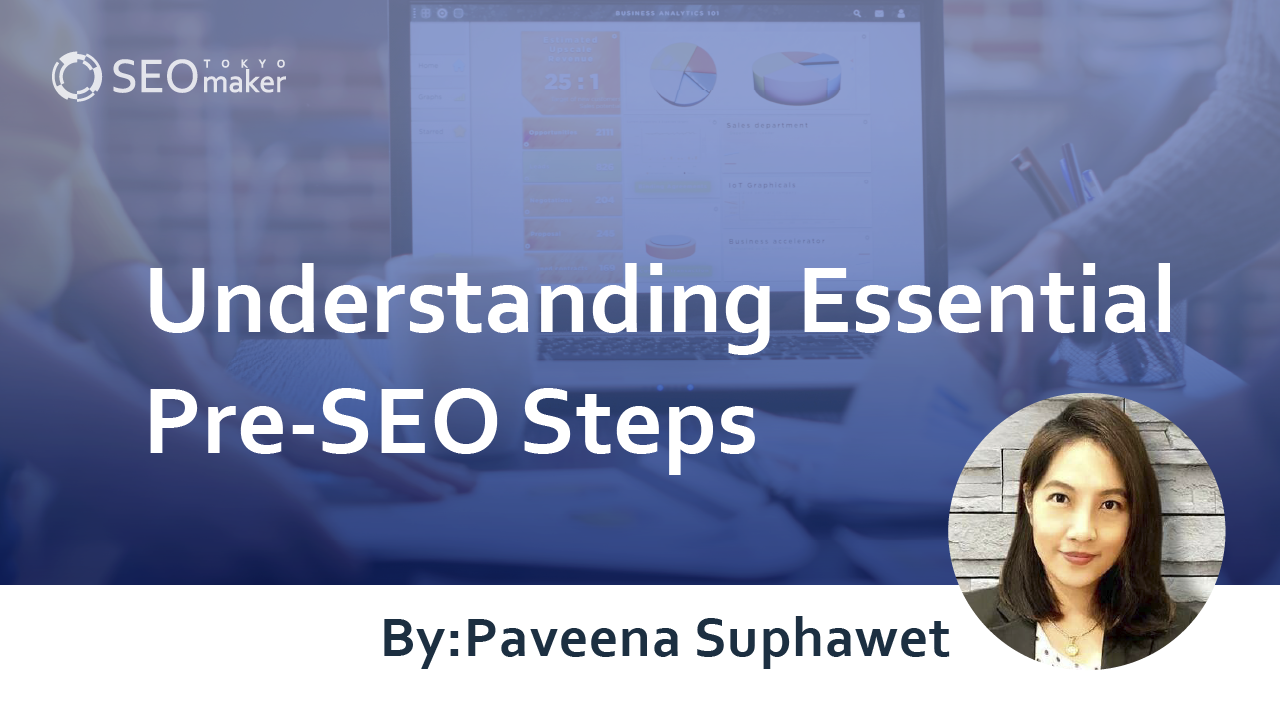Understanding Essential Pre-SEO Steps
contents

To succeed in SEO, it requires more than just techniques and tools; a strategic approach is essential. SEO is a long-term strategy, so it’s crucial to understand the broad outlines and consider whether you need to consult an expert before getting started.
In this article, we will detail the basic steps and considerations for implementing SEO, as well as the role of experts in this process.
|
Related Articles on SEO |
|
|
What is SEO Evaluation? |
What is information gathering in SEO? |
|
What is SEO? |
What is SEO in 2024? |
Preparing for SEO
Successful SEO requires a strategic combination of team efforts, processes, technology, and actions. To effectively implement SEO, the following six steps are crucial.
-Understanding How Search Engines Work
-Research
-Action Planning
-Implementation
-Monitoring and Maintenance
-Performance Analysis, Evaluation, and Reporting
Before initiating SEO, it’s essential to comprehend the technical processes of search engines to ensure that your content is appropriately tailored and visible.
In search engines like Google, there are four main stages.
- Crawling
- Rendering
- Indexing
- Ranking
Crawling is the process where search engines use links and sitemaps to discover web pages. Once pages are discovered, search engines use HTML, CSS, and JavaScript to generate how these pages appear (rendering). The content and metadata of the discovered pages are then analyzed and stored in a database (indexing). The algorithm examines various signals and decides if the pages are of sufficient quality to be displayed in search results when a query is entered, and then ranks them accordingly.
Understanding How Search Engines Work
Understanding the mechanics of search engines also involves grasping the tips for SEO.
Platforms like Google and Bing serve as platforms where users enter keywords (search queries) into a ‘search box’ to receive relevant information (web pages, images, etc.) as ‘search results.’
The search ranking process involves three steps.
- Crawling: Crawler (Googlebot) collects information from the web.
- Indexing: The collected information is categorized and registered in Google’s database.
- Displaying Results (Ranking): Based on the algorithm, the system displays the information it deems closest to what the user is looking for.
Search engines detect all available content on the internet (web pages, PDFs, images, videos, etc.) through the processes of crawling and indexing. The index is a database, a box where needed information is stored, from which the algorithm pulls data to display relevant search results to the user.
Google’s search algorithm is designed to display pages related to the search query and deemed trustworthy, providing valuable information to the user. Algorithm updates are made periodically to better align with this philosophy.
Research
Research is a crucial part of SEO. It involves various types of investigations to enhance SEO performance as follows.
- Audience Research
- Keyword Research
- Competitive Analysis
- Business Analysis
- Website Analysis
- SERPs Analysis
It’s important to correctly understand your target audience and their needs (audience research), identify valuable search keywords, and assess the level of demand and competition (keywords research).
Additionally, examining what competitors are doing (competitive analysis) and understanding how SEO can help achieve business objectives (business analysis) are vital.
Website technical SEO, content, links, and E-E-A-T (Expertise, Authoritativeness, Trustworthiness) are also key considerations (website analysis). Understanding the search intent behind specific queries and creating content that is likely to rank well (SERPs analysis) is essential for effective SEO practice.
Action Planning
An SEO strategy requires a long-term action plan. Set objectives and create a plan to achieve them. Remember, an action plan is not just about setting traffic number targets; it’s a roadmap to achieving your goals.
Therefore, the following are required in an SEO action plan.
- Set objectives and expectations (timeline and milestones)
- Define and adjust KPIs
- Decide on project creation and implementation methods
- Communicate with internal and external stakeholders
- Choose and implement tools
- Form and train teams
- Secure budgets
- Measure results and report
- Document strategies and processes
Implementation
Once research is complete, move on to the actual implementation. Broadly, it involves the following three aspects.
- Creating new content
- Modifying or enhancing existing pages
- Removing outdated or low-quality content
Monitoring and Maintenance
It’s essential to respond quickly if issues arise on your website or data is corrupted, thus monitoring is crucial.
You may need tools to check if significant pages are losing traffic, page speeds are slowing down, the site is unresponsive, indexed pages are dropping, or links are breaking.
Performance Analysis, Evaluation, and Reporting
Measuring is necessary for SEO improvement. Correct site analysis and reporting with the help of tools allow for data-driven decision-making.
-Website Analysis
-Tool Implementation
-Progress Reporting
At a minimum, implement tools like GA4, Google Search Console, and Bing Webmaster Tools to collect site performance data. Then, you can use tools for specific tasks and SEO tools to investigate performance.
Performance reports should compare with previous periods, like year-over-year or month-over-month, and be set at meaningful intervals, typically monthly or quarterly.
Do You Need an SEO Expert?
Can SEO be successfully managed by hiring an SEO expert?
An SEO expert is someone who is proficient in enhancing the visibility of websites on search engines. Today, experts are expected not only to understand SEO but also to have a deep knowledge of digital marketing overall, being specialized marketers for web acquisition.
While you can learn to optimize your site by reading a comprehensive guide to SEO, hiring an SEO consultant to support your page’s SEO can also help with the more technically challenging aspects.
Whether to use SEO services is a critical decision that could lead to improvements and time savings. Carefully consider the benefits of SEO services and the risks of engaging with irresponsible providers.
Before hiring a professional SEO consultant, it’s recommended to understand how search engines work and educate yourself about SEO.
Keep reading as we explain key points to consider in your SEO strategy, helping you grasp the bigger picture of SEO.
Competitive Analysis
In competitive analysis, we compare the number of indexed pages recognized by Google, the quantity and quality of external links, the domain authority (DA), and the pages that rank well for specific keywords.
The table below compares sites that rank highly for the monthly search term “Entrance door reform,” which has 18,100 searches. For comparing DA, we use MOZ. PLP (Preferred Landing Page) refers to the page you primarily want to rank higher. We have identified sites ranked from 1st to 15th. Some sites have managed to rank high despite having a DA lower than 20.
By studying these sites, we can understand strategies to achieve higher rankings for our target sites. We start by benchmarking and comparing attainable sites.
|
Rank |
DA |
PA |
Index Count |
Linking |
PLP |
|
1 |
60 |
52 |
29,700 |
24.6K |
Service Landing Page |
|
2 |
37 |
45 |
6,910 |
9.5K |
Service Landing Page |
|
3 |
16 |
19 |
613 |
122 |
Article |
|
4 |
93 |
55 |
11,700,000 |
82.7K |
Entrance Door List Page |
|
5 |
35 |
24 |
1,940 |
681 |
Article |
|
6 |
68 |
38 |
11,400,000 |
30.2K |
Article |
|
7 |
33 |
30 |
34,100 |
1.4K |
Entrance Door List Page |
|
8 |
15 |
4,370 |
96 |
Entrance Door List Page |
|
|
9 |
31 |
27 |
870,000 |
1.6K |
Entrance Door List Page |
|
10 |
51 |
31 |
1,760 |
170 |
Entrance Door Page |
|
11 |
22 |
3,910 |
292 |
Entrance Door List Page |
|
|
12 |
93 |
47 |
12,000,000 |
Entrance Door List Page |
|
|
13 |
36 |
31 |
137,000 |
2.8K |
Home Page |
|
14 |
10 |
1,050 |
52 |
Home Page |
|
|
15 |
35 |
75,100,000 |
681 |
Service Landing Page |
Following competitive analysis, we move on to keyword selection and begin to develop a keyword strategy, marking the transition into concrete SEO measures.
Summary
This article has outlined the concrete steps for practicing SEO, including research, action planning, actual implementation, site monitoring and maintenance, and performance analysis and evaluation. It also discusses the role and necessity of SEO experts, along with the support they provide. For SEO success, it is crucial to follow these steps thoroughly.










![What is a Description? Explaining the Meaning, Writing Style, and Changing Word Count – [2023 Edition]](https://www.switchitmaker2.com/en/wp-content/uploads/2024/09/what-is-description.webp)










